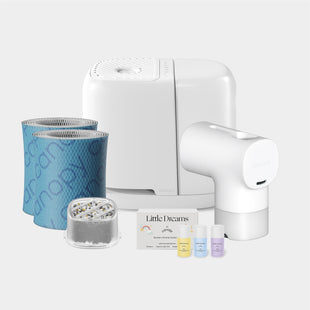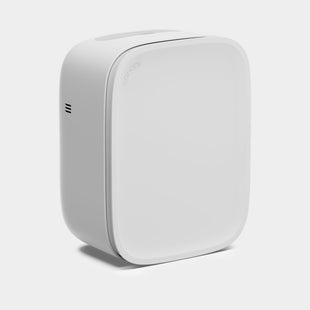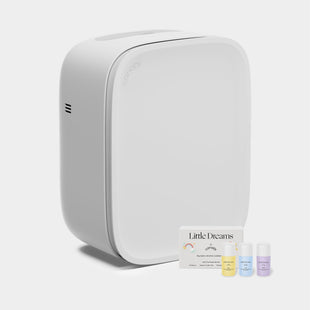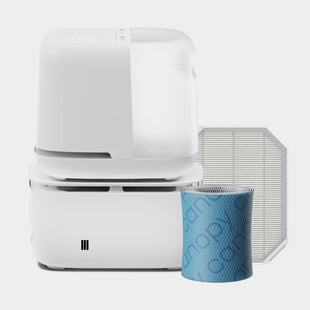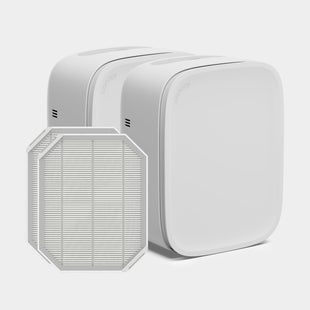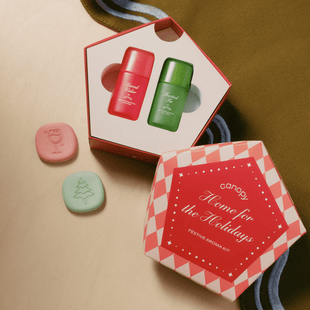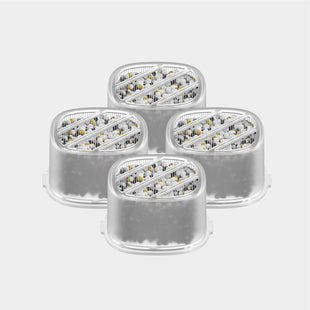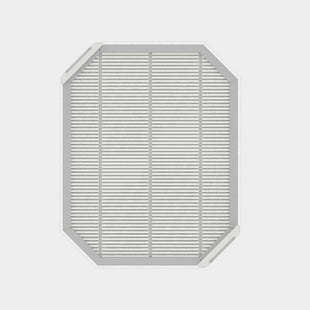This content has been reviewed and updated on September 3, 2024.
Humidifiers and diffusers share many similarities, especially if you choose a device that emits a fine mist into the air. However, these appliances have different functions. That’s why you might be surprised that humidifiers and diffusers are actually quite different, and using them interchangeably may not provide the benefits you’re looking for. But which is the better option for your needs?
Our guide to the difference between a humidifier and a diffuser will sort out all of the nitty gritty details for you so you can make the best decision.
What Is a Humidifier?
Humidifiers increase the moisture levels in your home, office, or personal space by releasing water vapor into the air. The ideal humidity level in your home is between 40-60%. Any higher, and your home can feel damp and overly warm. Additionally, there’s a greater risk for water damage and for mold spores to spread.
Low humidity inside your home isn’t much better, and when you run the air conditioner and heater, it can pull moisture from the air and make it feel dry and uncomfortable. In some cases, the indoor humidity can be as low as 15 to 20%, which can cause a long list of issues, including dry and itchy skin, irritated nasal passages, increased static electricity, and a greater risk for cold and flu viruses to spread.
It’s more likely for the moisture level inside your home or office to fall below the ideal level and leave the air too dry, because of heating and cooling. Increasing the relative humidity of your home or office space can make it more comfortable, and benefit your overall health and well-being.
3 Types of Humidifiers
When you shop for a humidifier, you’ll find several types, including ultrasonic, evaporative, and steam or warm mist. While all of them can increase the moisture levels of surrounding spaces, they differ in how they release water vapor into the air.
Ultrasonic Humidifier
An ultrasonic humidifier has a metal diaphragm that vibrates at sonic speed, creating microscopic water droplets. The unit’s fan blows those droplets into the space in the form of a cool mist.
Evaporative

Evaporative humidifiers, like the Canopy line of humidifiers, use a moistened wick and a fan to release moisture into the air. A tank of water keeps the wick moist, and when the humidifier pulls air in from the room, it’s directed through the wick and blown back out, increasing the humidity. What’s especially attractive about these humidifiers is that there isn’t any mist, so you don’t need to worry about water damage.
Steam-Based Humidifier
Steam-based humidifiers, also known as warm mist humidifiers or vaporizers, boil the water in the tank, then release the warm, fine vapor into the room. These humidifiers can increase room temperatures slightly, but the boiling water is a greater concern. If a curious child or a pet pulls the unit off the table or knocks it over, the heated water can cause severe injuries.
What Health Benefits Do Humidifiers Offer?
Humidifiers can help provide several benefits for your overall health and wellness, particularly during the dry, winter months. The increased relative humidity emitted from your humidifier device can do the following:
- Improve congestion
- Reduce the severity of common cold symptoms
- Reduce the severity of asthma flare ups
- Delay the signs of skin aging including fine lines and wrinkles
- Improve transepidermal water loss (TEWL), which causes dry, inflamed skin on your face and body
- Alleviate allergy symptoms
- Soothe dry, irritated eyes
- Ease respiratory symptoms in babies
Adding moisture can also help protect your home by reducing static electricity and keeping wood and leather from drying out.
What Is a Diffuser?
Now that you know how a humidifier works, what’s the difference between a humidifier and a diffuser? Is a diffuser a humidifier?
A diffuser is a device that disperses essential oils into the air in the form of a fine mist. Essential oils combine with water droplets, which fan out into the room releasing the the scents of the oil. Not only does this make your space smell good, but it also offers some therapeutic benefits.
Here’s where you’ll find the big difference between a humidifier and a diffuser. An essential oil diffuser may slightly increase humidity, but the limited tank size prevents a diffuser from adding enough moisture to make a significant difference to the overall relative humidity.
The solution isn’t to add your essential oils to the humidifier to enjoy the benefits of both moisture and aromatherapy, though. Most humidifiers aren't compatible with essential oils and adding them to the water tank can actually damage the device.
Types of Diffusers
Similar to humidifiers, diffusers can be ultrasonic, evaporative, or heat-based and operate like their humidifier equivalents. You can also choose a nebulizing diffuser, which is the most potent style of diffuser operating without water. These diffusers use an atomizer to disperse essential oil into fine particles before releasing them into the air. These droplets aren’t partnered with water molecules, so they can produce slightly stronger aromas than water-based diffuser styles.
The Health Benefits of a Diffuser

Diffuser benefits are primarily achieved through the essential oils released into the air. There’s substantial evidence of the connection between your olfactory nerves (sense of smell) and your brain, and different scents can trigger different responses. Lavender essential oil, for example, can improve sleep and reduce feelings of stress and help you feel calmer and more relaxed. Eucalyptus essential oil is associated with improved mental clarity and can also help alleviate respiratory symptoms, helping you feel better when you have a cough and congestion.
Different oils have different properties; citrus oils are ideal for boosting energy, while bergamot can help unwind. Ultimately, the benefits of diffusing essential oils largely depend on the essential oil you choose to diffuse and how many drops you add to the diffuser.
Humidifier vs. Diffuser: Which Is Right For You?
Now that you know how they work, is a humidifier or diffuser better for you? Do you need to invest in both? (Spoiler alert: You don’t.)
If you want to hydrate the air, you need a humidifier. As mentioned, some diffusers can add a small amount of moisture to the air, but the smaller water tanks (most hold between 100 mL and 500 mL of water at the most) mean that they won’t add very much moisture. Therefore, if increasing moisture is your primary goal, the humidifier is the better choice.
However, if you want to enjoy the benefits of aromatherapy and aren’t concerned about hydrating the air, a diffuser is the better choice.
Canopy makes it easy to decide with a family of humidifiers and diffusers that help you create the environment you want in your home, office, or personal space. Unlike other humidifiers that aren’t compatible with essential oils, all Canopy devices include the option to diffuse aromas while adding clean moisture to the air.
Our Bedside Humidifier and parent-loved Nursery Humidifier devices don’t release mist or vapor, and both use an Aroma Puck to help disperse the fragrance oils. Similarly, the Large Room Humidifier is a vapor-free option with two ways of providing aroma benefits. This model works with both the Aroma Puck for a light hint of scent and the Diffusion Well for stronger, longer lasting diffusion.
The Portable Humidifier, which can be taken on the go for that perfect boost of hydration, is the only humidifier from Canopy that releases a fine, light mist. The device comes with a magnetic Aroma Puck that is compatible with the humidifier's grate design.
If you prefer to diffuse your favorite scent without humidifying the air, Canopy’s Diffuser is the perfect choice. The Canopy model doesn’t require water or release mist into the air. Simply add the oil to an Aroma Puck or the Diffusion Well, choose your fan speed, and enjoy the scent.
Explore the Canopy family of products, including exclusive essential oil blends, and experience the benefits of clean hydration and aromatherapy without having to decide between a humidifier vs. diffuser.









